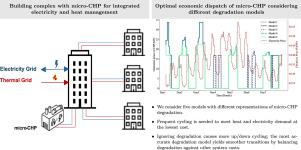Optimal scheduling of micro combined heat and power units: Impact of degradation costs
IF 10.9
1区 工程技术
Q1 ENERGY & FUELS
引用次数: 0
Abstract
Increasing uncertainty and intermittency in the energy grid require greater flexibility. Micro-combined heat and power (micro-CHP) systems enhance flexibility by generating both heat and electricity while also supporting grid stability. However, frequent cycling and varying operational conditions may accelerate component degradation, which can affect both the lifetime and economic performance of such systems. This paper presents a cost-minimizing dispatch model for micro-CHP units based on micro gas turbines, which incorporates a more detailed degradation cost model compared to existing approaches. The proposed degradation model accounts for both operational degradation, driven by turbine blade temperature and rotational speed, and degradation caused by startup and shutdown cycles, including damage during critical speed transitions. A case study of a building complex in Germany is used to test the model under different operating conditions. The results show that including degradation costs leads to dispatch schedules with 12% lower total costs over one year, and up to 50% lower costs in some weeks. The results further show that it is not economically beneficial to overload the micro-CHP unit, even for short periods of high demand, as the additional degradation would offset any potential savings in the short term.

微型热电联产机组的优化调度:退化成本的影响
日益增加的不确定性和能源网络的间歇性需要更大的灵活性。微型热电联产(micro-CHP)系统通过既产生热电,又支持电网稳定,从而提高了灵活性。然而,频繁的循环和变化的操作条件可能会加速组件的退化,这可能会影响这些系统的使用寿命和经济性能。本文提出了一种基于微型燃气轮机的微型热电联产机组成本最小化调度模型,该模型与现有方法相比,包含了更详细的退化成本模型。所提出的退化模型既考虑了由涡轮叶片温度和转速驱动的运行退化,也考虑了由启动和关闭周期引起的退化,包括临界转速过渡期间的损坏。以德国某综合建筑为例,在不同工况下对模型进行了验证。结果表明,包括降解成本在内的调度计划在一年内降低了12%的总成本,在某些周内降低了50%的成本。结果进一步表明,即使在短时间的高需求期间,超载微型热电联产机组在经济上也没有好处,因为额外的退化将抵消短期内任何潜在的节省。
本文章由计算机程序翻译,如有差异,请以英文原文为准。
求助全文
约1分钟内获得全文
求助全文
来源期刊

Energy Conversion and Management
工程技术-力学
CiteScore
19.00
自引率
11.50%
发文量
1304
审稿时长
17 days
期刊介绍:
The journal Energy Conversion and Management provides a forum for publishing original contributions and comprehensive technical review articles of interdisciplinary and original research on all important energy topics.
The topics considered include energy generation, utilization, conversion, storage, transmission, conservation, management and sustainability. These topics typically involve various types of energy such as mechanical, thermal, nuclear, chemical, electromagnetic, magnetic and electric. These energy types cover all known energy resources, including renewable resources (e.g., solar, bio, hydro, wind, geothermal and ocean energy), fossil fuels and nuclear resources.
 求助内容:
求助内容: 应助结果提醒方式:
应助结果提醒方式:


